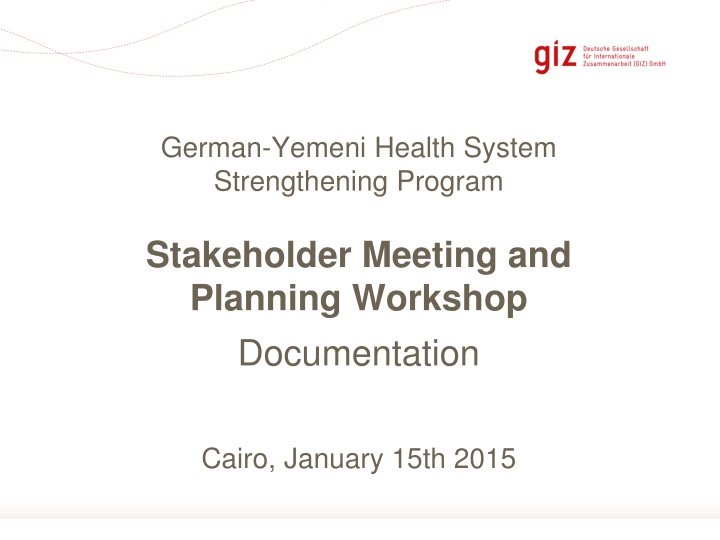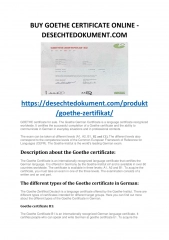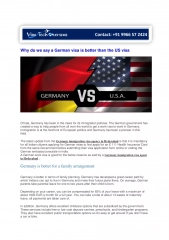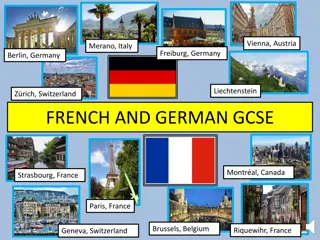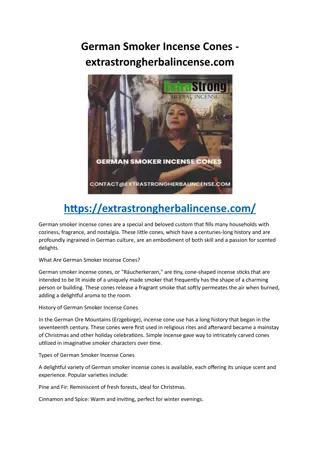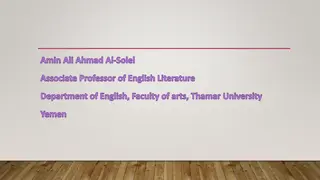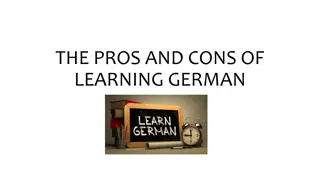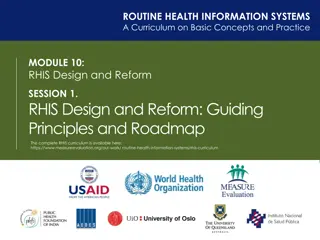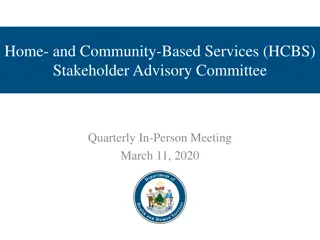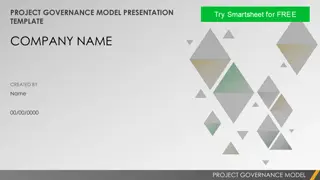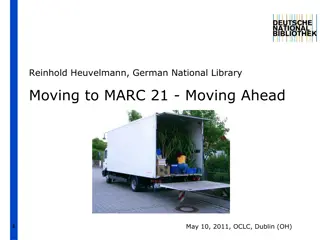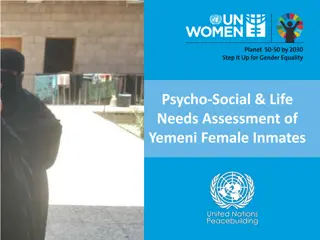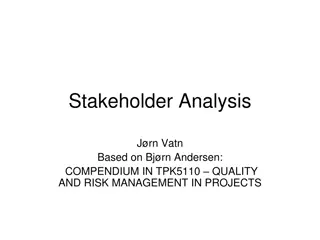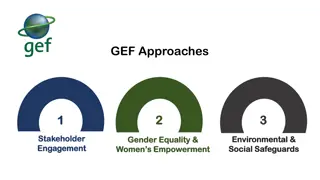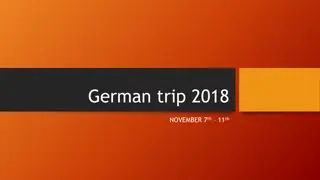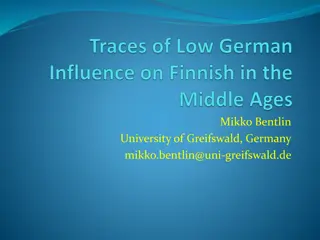German-Yemeni Health System Strengthening Program Stakeholder Meeting Documentation
The documentation captures key discussions from a stakeholder meeting in Cairo regarding the German-Yemeni Health System Strengthening Program. It includes insights on health financing, leadership in health, training needs, and collaborative efforts to strengthen the Yemeni health system. Stakeholders emphasized the importance of partnerships, capacity building, and coordinated planning towards achieving shared goals. The program aims to enhance health quality, promotion, and financing in Yemen through collaborative activities with various stakeholders.
Download Presentation

Please find below an Image/Link to download the presentation.
The content on the website is provided AS IS for your information and personal use only. It may not be sold, licensed, or shared on other websites without obtaining consent from the author.If you encounter any issues during the download, it is possible that the publisher has removed the file from their server.
You are allowed to download the files provided on this website for personal or commercial use, subject to the condition that they are used lawfully. All files are the property of their respective owners.
The content on the website is provided AS IS for your information and personal use only. It may not be sold, licensed, or shared on other websites without obtaining consent from the author.
E N D
Presentation Transcript
German-Yemeni Health System Strengthening Program Stakeholder Meeting and Planning Workshop Documentation Cairo, January 15th 2015 Page 1
Introduction of the agenda and goal of the workshop (Jean-Olivier Schmidt, GIZ Germany) Page 2
Remarks by WHO, Dr. Jamal Nasher Outline of partnerships and initiatives with regard to UHC What has happened in health financing in Yemen in the past? Changing environment is a constant challenge. WHO engagement in health financing: EU Policy Dialogue (envisaged outcomes: OASIS, Health Financing Strategy) Support to MoPHP for the development of Strategic directions to strengthen public health in Yemen Insert PPT! Page 3
Comments from the participants It is important to consider training needs. Policy-dialogue must be established at different levels: High-level dialogue for decision makers Technical-level dialogue 08.10.2024 Page 4
Remarks by MoPHP, Dr. Adel Al-Moayed Dr. Adel highlighted the importance of leadership for health. Health concerns all of us. Health financing is a key element when it comes to health system strengthening. This meeting is particularly important because there are so many different stakeholders from different ministries and institutions present. At the end of the workshop, Dr. Adel wishes to have a clear vision and working plan reflecting collaborative activities towards the achievement of jointly developed goals and objectives. Page 5
Presentation of the German-Yemeni Health System Strengthening Program, Alexandra Pl schke Contribute to strengthen capacities for better performance of Yemeni health system in the area of quality management, health promotion and health financing Changing environment changing program strategy Link to P4H recommendations (UHC roadmap) Strengthen capacities by supporting a network of Yemeni experts on health financing to guide the reform process in Yemen; planned activities for 2015 Make the case for health Overview: German-Yemeni Health System Strengthening Program Close cooperation with WHO and other development partners Learning by doing, learning from each other Speaking one language is the prerequisite for working together effectively. Double-click on symbol to open presentation Page 6
Introduction group work I: Priorities in health financing in Yemen: Going for the WHAT in 2015 Develop and present your own priorities for 2015 Use as background the discussions from previous day around the UHC roadmap. Priorities should not be focussed on GIZ or WHO support, but focus on the institution itself. Groups formed Suggested criteria for priorities: 1. 2. Ministry of Public Health and Population Ministry of Finance and Ministry of Planning and International Cooperation Ministry of Labour and Social Affairs General Authority of Social Health Insurance Academia Necessity Sequential logic 3. 4. Feasibility (taking into account what can realistically be achieved in 2015) 5. Page 7
Presentation of working group results I Insert pictures of each pin board Translation (arabic-english) of cards on pin board For the moment, please find documentation of the group work results (both rounds of working groups) in english as well as arabic version attached to the email. I will only insert the results as a picture in the PPT once it is confirmed that the translation is correct. Otherwise it will be difficult for you to comment on it and adapt it if necessary. Page 8
Inter-sectoral cooperation: the case of RSBY in India, Nishant Jain (GIZ India) Main messages: Health financing reform requires a coordinated effort of many different ministries and institutions. Design the product based on the needs of the user. Establish a learning process as you start the implementation. Assign clear responsibilities among stakeholders for each step of the process. Story of lion and rabbits: Implementers are equally important as policy makers. Establish a system to collect feedback: beneficiary at the center of the system. Even though it looks complex and challenging, you can do it as many countries across the world have done. Process flow chart RSBY health insurance scheme You can start small but always keep the big picture and larger objective in mind. Double-click on symbol to open document Page 9
Summary of priorities and importance of intersectoral cooperation, by Dr. Michael Thiede Despite a diversity of topics the groups presentations revealed a range of common themes Academia emphasized training courses; also SHIA highlighted need for capacity development link Guiding principles for group work II: SHIA expressed need to work on database Urgency of formulating recommendations to the Minister for discussions in Parliament was highlighted by MoF Define responsibilities Reach understanding between the different partners Establish an inter-sectoral UHC committee Financing options to take into account three population groups Think systemic complex system HF strategy requiring in-depth analysis (e.g. OASIS) MoLSA highlighted importance to consider the specific needs of people with disabilities and the poor Page 10
Introduction Group work II: Defining roles and responsibilities, stakeholder contributions, by Alexandra Plueschke Method: World Cafe The World Caf is an interactive method for dialogue. Participants are sitting in groups in a caf -style setting in order to create maximum participation and atmosphere. Participants are invited to visualize their discussions on cards and display on the pin boards. After 20 minutes discussion the group moves to the next table to listen and discuss the results of the other groups, After 15 minutes go to the next table. Page 11
Introduction Group work II: Defining roles and responsibilities, stakeholder contributions World Cafe Tasks: 5 Working groups by organisation Nominate 1 chair/host for each organisation Discuss the following questions: 1. What is the role & responsibilities of your organisation to make the priorities happen by 2015? 2. What is your contribution to achieve these priorities by 2015? 3. What do you need to do by when? Write your points on cards and display on the pinboard Page 12
Introduction Group work II: Defining roles and responsibilities, stakeholder contributions Priority xyz Role of your Organisation (mandate, expertise) Your Contributions by others (Yemeni organisations) By when ? contributions (activities) Page 13
Documentation: results of group work II For the moment, please find documentation of the group work results (both rounds of working groups) in english as well as arabic version attached to the email. I will only insert the results as a picture in the PPT once it is confirmed that the translation is correct. Otherwise it will be difficult for you to comment on it and adapt it if necessary. 08.10.2024 Page 14
World Cafe: Feedback of the participants Revealed clear links between the different sectors and strengthened the collaborative spirit. The exercise helped to define responsibilities of the different sectors. It is important to make use of the information that we have gathered. Try to think independent and not to shift to other side. The participative approach of the world cafe methodology facilitated learning. A single party can never solve this problem, all sectors, when they work together, can find solutions to the problem. Did something completely new or suprising come up during the discussions? I was surprised that MoF is considering the introduction of new taxes. Participation of all related parties in this workshop is very important; I hope this cooperation will last. Page 15
Working together inter-sectoral cooperation for health financing Questions regarding the setting-up of a successful inter-sectoral working group: Do you have any experience with inter-sectoral committees? What were the factors that led to the success? What were the factors that led to the failure of the process? What do we need to set up such an inter-sectoral committee? Who should be represented in this inter-sectoral committee for health financing? How to maintain this inter-sectoral committee? Page 16
Experiences with inter-sectoral working groups Health sector: Councils for health development support: coordination at level of municipality is more successful. Certain sectors did not effectively participate; other sectors did not know their role in the other sector / in the process. Technical committee to revise Social Health Insurance Law (MoF) Set up by ministerial decree to revise the law. Why was it a failure? No technical support, very high time pressure, nothing was concluded/no recommendations, no follow-up from Parliament, change in government (no interest); task was enormous, deadline was not extended. Page 17
Experiences with inter-sectoral working groups MoPIC is often a member of different committees as observer/supervisor: Do not set too high expectations. Ministry is not ready; if there is not a complete project, it does not make sense. Numerous joint committees in MoPHP: Plan needed that brings together the stakeholders, objectives and goals, mandates and tasks of each entity (will also facilitate monitoring). Select the right members to participate: strong commitment needed. Financing of the committee has to be secured (allocations/ resources). Monitoring and follow-up (just like any other project); goals and indicators need to be defined. Page 18
Experiences with inter-sectoral working groups The more the decision makers are convinced of the importance of the technical committees, it is possible to achieve results. EU has provided support for setting up councils in certain provinces (led by governors, MoPHP, Social Fund etc.): mechanism for implementing the projects supported by the donors. External support is very important: Donors can convince the government to committing to health as a priority. Make use of the governorates experiences with inter-sectoral cooperation at the national level. Shura council has health committee; Cabinet has a health circle; Presidency has a health circle (why are they working in isolation?) Page 19
Summary: How multisectoral collaboration succeeds or fails Factors of success Factors of failure Mutual learning across administrative levels (e.g. learning from governorates) No political interest (lack of follow-up) Unrealistic timelines / time limit Lack of technical support Donor support (e.g. persuade gov t of health as a priority) Decision-makers need to be convinced commitment political Committee is a project and must be dealt with accordingly Lack of (active) participation Monitoring of committee s activities (based on appropriate indicators) Allocations assigned to committee (financial resources) Without clear project definition, Committee will not work - clear benefit to each member required Right composition of committee (institutions, people) Plan! Tasks for each entity must be clear (TOR) Adoption of underlying idea Advocacy (requirement of media partners) Listen to local administration Need to include private sector Sufficient human resources Inconsistent funding of committees 08.10.2024 Page 20
What is needed to set up an inter-sectoral working group for health financing? Political will: Health is politics; UHC is politics Sustainability of projects is key Need technical support and logistical support Policy unit in MoPHP should be focal point of the group Secretariat Raise awareness for health Involve media for advocacy. Which stakeholders should be represented in the inter-sectoral working group for health financing? UHC is responsibility of all sectors, not only health everybody is a beneficiary; representation should be more comprehensive. For high-level committee and support, it should be considered to involve representative(s) from executive offices (such as the President s office). Private sector and civil society is also a partner in development. Local administration /governorates should be represented. Page 21
How could the development partners support such an intersectoral working group? Development partners support is an incentive for the working group. DPs should accompany the team and process facilitating role SPs should adopt to changing environment. Page 22
Summary of success factors for inter-sectoral working group (by Jean-Olivier Schmidt) Political committment. Getting the right people on board. Define the mandate and allocate ressources. Develop terms of reference with clear objective. Page 23
Who is going to take this agenda forward? It should be a joint championship among all stakeholders ownership. Leadership should be at MoPHP. The responsibility lies with all the stakeholders. MoPHP will have a briefing with the Minister in order to reach political committment. 08.10.2024 Page 24
Next steps and way forward (by Alexandra Plueschke) Documentation of the results of the workshop shall be ready within 1 week. Summarize success factors for inter-sectoral cooperation in Yemen and adapt it to the needs of MoPHP in the lead. There is a consensus that for high level committment and leadership, facilitation from development partners would be helpful. WHO/ GIZ as technical cooperation partners are ready to support MoPHP to make the case for health at higher level. Page 25
Participants Adapt WHO participant list. 08.10.2024 Page 26
